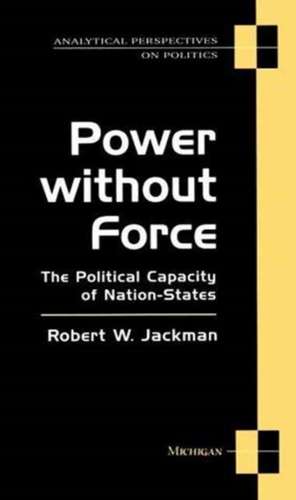Power without Force: The Political Capacity of Nation-States: Analytical Perspectives On Politics
Autor Robert W. Jackmanen Limba Engleză Paperback – 6 sep 1993
Decolonization after World War II led to a significant global increase in the number of states. Each new nation was born with high expectations. But these hopes were soon eroded by the ineffectiveness and capriciousness of many of the new regimes. In many states military juntas have become the order of the day, and even where juntas have not taken power, political differences have repeatedly degenerated into violent exchanges that do not readily lend themselves to political settlement. Not only the new states have suffered from these problems; indeed, political solutions to conflict have become depressingly conspicuous by their absence.
Against this background, the last decade has seen a resurgence of interest in evaluating the political capacity or strength of modern nation-states. In Power without Force, Robert Jackman argues that political capacity has two broad components: organizational age and legitimacy. Thus, it is essential to focus both on institutions conceived in organizational terms and the amount of compliance and consent that leaders are able to engender. The emphasis on each reflects the view that political life centers on the exercise of power, and that, unlike physical force, power is intrinsically relational. Although all states have he capability to inflict physical sanctions, their ability to exercise power is the key element of their political capacity.
Drawing on a wide range of studies from political science, sociology, and political economy, Power without Force redirects attention to the central issues of political capacity. By stressing that effective conflict resolution must be addressed in political terms, this volume underscores perennial issues of governance and politics that form the heart of comparative politics and political sociology.
Against this background, the last decade has seen a resurgence of interest in evaluating the political capacity or strength of modern nation-states. In Power without Force, Robert Jackman argues that political capacity has two broad components: organizational age and legitimacy. Thus, it is essential to focus both on institutions conceived in organizational terms and the amount of compliance and consent that leaders are able to engender. The emphasis on each reflects the view that political life centers on the exercise of power, and that, unlike physical force, power is intrinsically relational. Although all states have he capability to inflict physical sanctions, their ability to exercise power is the key element of their political capacity.
Drawing on a wide range of studies from political science, sociology, and political economy, Power without Force redirects attention to the central issues of political capacity. By stressing that effective conflict resolution must be addressed in political terms, this volume underscores perennial issues of governance and politics that form the heart of comparative politics and political sociology.
Din seria Analytical Perspectives On Politics
-
 Preț: 275.10 lei
Preț: 275.10 lei -
 Preț: 282.51 lei
Preț: 282.51 lei -
 Preț: 204.29 lei
Preț: 204.29 lei -
 Preț: 203.66 lei
Preț: 203.66 lei -
 Preț: 194.80 lei
Preț: 194.80 lei - 18%
 Preț: 598.88 lei
Preț: 598.88 lei
Preț: 194.90 lei
Nou
Puncte Express: 292
Preț estimativ în valută:
37.30€ • 38.80$ • 31.26£
37.30€ • 38.80$ • 31.26£
Carte indisponibilă temporar
Doresc să fiu notificat când acest titlu va fi disponibil:
Se trimite...
Preluare comenzi: 021 569.72.76
Specificații
ISBN-13: 9780472082360
ISBN-10: 0472082361
Pagini: 208
Ilustrații: numerous tables
Dimensiuni: 152 x 229 x 15 mm
Greutate: 0.3 kg
Editura: UNIVERSITY OF MICHIGAN PRESS
Colecția University of Michigan Press
Seria Analytical Perspectives On Politics
ISBN-10: 0472082361
Pagini: 208
Ilustrații: numerous tables
Dimensiuni: 152 x 229 x 15 mm
Greutate: 0.3 kg
Editura: UNIVERSITY OF MICHIGAN PRESS
Colecția University of Michigan Press
Seria Analytical Perspectives On Politics
Recenzii
"The synthesis of evolving scholarly debates since the 1950s on these themes is a masterpiece of compressed yet comprehensive critique. The brief for political capacity as a master concept is both stimulating and provocative. The Jackman volume is a major intellectual achievement."
—American Political Science Review
—American Political Science Review
"This work represents an important and effective revaluation of existing literature on development and provides one of the clearest expositions of the critical building blocks of political capacity to appear in decades."
—Mershon International Studies Review
—Mershon International Studies Review
Descriere
Explores the ways states build political capacity; discusses how states learn to resolve conflict politically rather than violently
